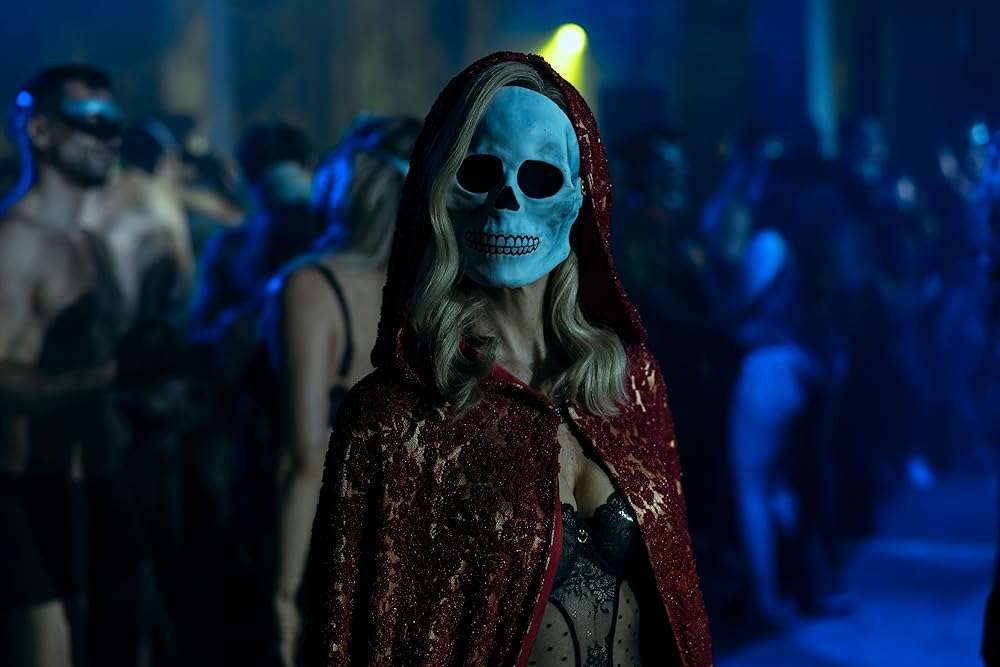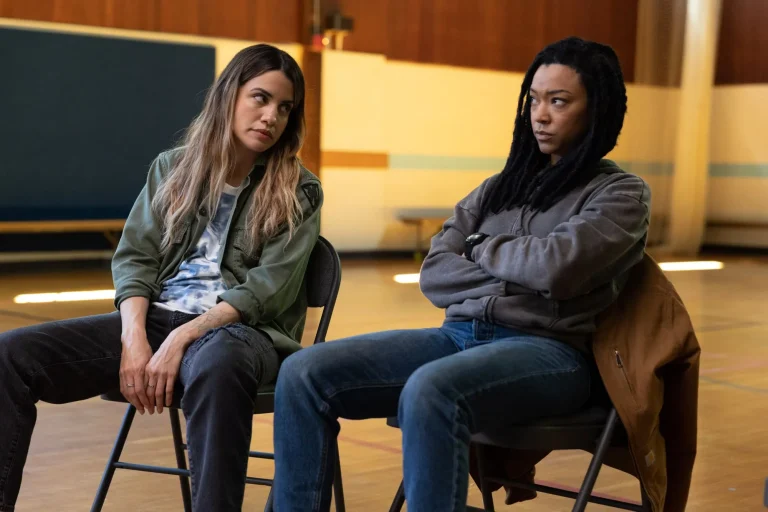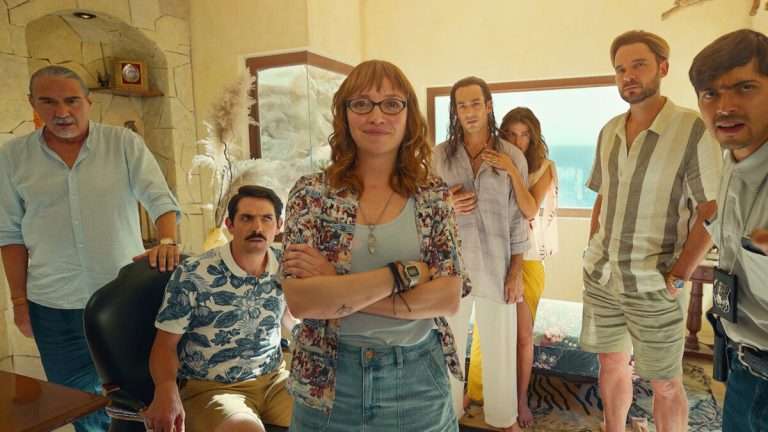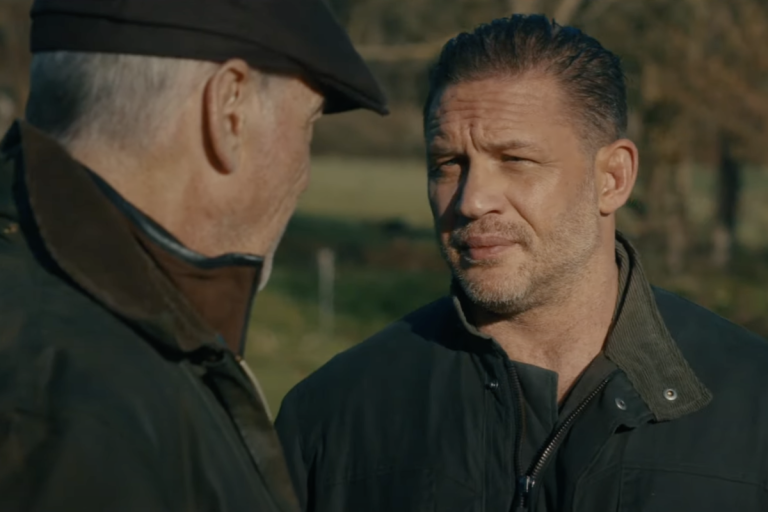In Edgar Allan Poe’s tense, atmospheric short story, The Fall of the House of Usher, the family legacy is intricately connected to the house itself, which slowly cracks and decays along with its inhabitants. Heavy, inescapable guilt grips Roderick Usher, who mourns the death of his twin sister, Madeline, who has been entombed alive in the basement below. As Madeline’s rage unleashes and takes Roderick down with it, the House of Usher also collapses, surrounded by a glimmering lake that hints at something more ominously preternatural.
Mike Flanagan’s The Fall of the House of Usher takes this core premise to weave a brutal, uncompromising story about the rise and fall of a pharmaceutical empire built at the expense of thousands, if not millions. Twins Roderick (Bruce Greenwood) and Madeline (Mary McDonnell) Usher have amassed unimaginable wealth as those sitting atop the Fortunado pharmaceutical company, which has profited off an opioid named Ligodone that claims to “eliminate pain” altogether.
While this claim holds water, the side effects of a harmful drug marketed as non-addictive claim countless lives and rake up the number of legal cases that Fortunado has to contend with. However, somehow, Fortunado always emerges unscathed, thanks to the shrewd efforts of family attorney Arthur Pym (Mark Hamill).
Fortunado’s biggest opponent is government representative C. August Dupin (Carl Lumbly), who has been trying for years to ensure that justice is served, but to no avail. The latest lawsuit, however, has significantly increased stakes, which leaves the Ushers scrambling, especially after all of the Usher children — both legitimate and illegitimate — start dropping dead over a span of two weeks. This is revealed right at the start, and the mystery lies in the whys and hows, where each death is as brutal as it gets, a marker of the hamartia that every Usher carried within them throughout their lives.
There’s a lot to unpack in every episode, as Roderick contextualizes the deaths of his children against his and Madeline’s murky past, tracing their adolescent years that were marked with hardship to later decades that demanded deliberate cruelty. This brand of apathetic shrewdness, which only the ultra-rich brandish like a weapon, doesn’t stop with Roderick or Madeline (although the latter chose to remain childless) but seeps into every Usher in one way or another.

Frederick (Henry Thomas), next in line for the inheritance and the oldest, simpers and boasts his way through his life. At the same time, his sister, Tamerlane (Samatha Sloyan), is desperate to launch a GOOP-like lifestyle brand to prove her worth to her father. The others, including Camille (Kate Siegel), Victorine (T’Nia Miller), Leo (Rahul Kohli), and Prospero (Sauriyan Sapkota), sport their own Usher-isms that seal their fates in ways that are inevitable. Yet, these toxic tendencies, which are utterly tragic in some cases, are direct repercussions of some choices that Roderick and Madeline made as ambitious siblings eager to see the world at their feet.
The homage to Poe’s work is on full display here, where character names reference other works of the writer, including poems such as Tamerlaine and horror shorts such as The Premature Burial. We see visual cues strewn across the intricate web of lies and secrets, which remind us that this adaptation uses Poe’s oeuvre to enrich itself. However, the results can be mixed at times, as Poe’s decorative prose, which is perfect for Flanagan’s monologues, clashes directly with the modern-day setting in a way that feels jarring. Roderick is the only person who seems capable of containing these disparate elements, and he does, pulled back by the nostalgia of the past and the horrors that haunt him in broad daylight, following him to the very end.
While the miniseries’ keeps its Poe-isms at surface level, occasionally making thematic ties to death, loss, and devastation that peppered the author’s work, Flanagan introduces emotional cruxes that work beautifully outside of their dependence on literary works. The Ushers emerge as beings utterly deserving of our ire as we watch them clawing at the last remnants of their tainted legacy, which was so utterly hollow, to begin with. Flanagan employs sharp commentary to critique the callous indifference of the rich, the ultimate price of such dynasties built on the deaths of innocents, and the despicable, empty emotional mechanisms that the corrupt often employ to justify their evils.
There are flashbacks that demand more flashbacks, as it is crucial to understand the younger Ushers (Zach Gilford and Willa Fitzgerald, both brilliant) and the trajectory of their lives. Perhaps the greatest cruelty is that both Roderick and Madeline have had to contend with humiliating dismissal by those in power when they were powerless, and the duo chose to follow in those footsteps for survival.
Sure, there’s always a choice and a choice was made, one where morality was discarded in favor of hardened survivalism that gradually lost meaning when the money started piling up. It’s never enough, as there’s an insatiable thirst for more: with accumulating wealth, there’s also guilt that fills up the mind and the soul, bursting forth like a dam when acute loss is the only defining characteristic of reality.
As the House of Usher crumbles, taking everyone with it, Flanagan proves himself yet again as a pioneer of modern horror, the kind that compels you into thoughtful rumination. The Fall of the House of Usher is a triumph in storytelling. It is peppered with crumbs of revered texts that induce fascinating results while furthering the erasure of a dynasty doomed to consume itself from within, one death at a time.





![Neymar: The Perfect Chaos [2022] ‘Netflix’ Review: It Will Come Across as The Perfect Disappointment](https://79468c92.delivery.rocketcdn.me/wp-content/uploads/2022/01/Neymar-The-Perfect-Chaos-2022-768x432.jpg)

![The 400 Blows [1959]: An unsentimental film about Adolescence](https://79468c92.delivery.rocketcdn.me/wp-content/uploads/2015/12/vlcsnap-2015-12-01-22h42m06s658.png1.jpg)
